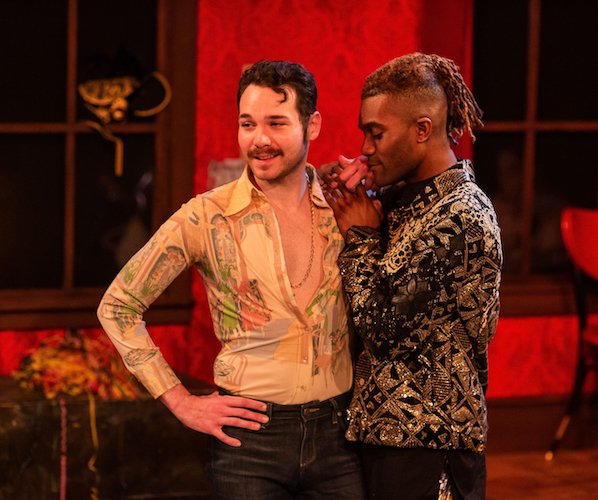Theater Review: “The View UpStairs” — Celebrating a Milestone
By Robert Israel
As a vision of gay bonding, The View UpStairs exudes a wonderful in-your-face spirit.
The View UpStairs by Max Vernon (Book, Music, Lyrics). Directed by Paul Daigneault. Staged by SpeakEasy Stage Company in the Plaza Theatre at the Boston Center for the Arts, 537 Tremont Street, Boston, through June 22.

Eddie Shields and J’royce Jata in the SpeakEasy Stage Company production of “The View UpStairs.” Photo: Nile Scott Studios.
Inspired by the 1973 firebombing of the UpStairs Lounge in New Orleans, the one-act musical The View UpStairs testifies to the LGBTQ community’s refusal to be intimidated by violence. The SpeakEasy Stage Company production coincides with the 49th annual Boston Pride Festival (on June 16) and reinforces a major theme in World PrideNYC, which commemorates another tide-turning event: the 50th anniversary of a riot in downtown New York in which gay patrons at the Stonewall Inn fought against police brutality.
Making energetic use of the constricted space in the BCA’s Plaza Theatre, the 10-member cast, in character, flirts with audience members before the show begins, sashaying between floor-side cabaret tables and flouncing up the stairs. Unfortunately, there’s a downside to Abby Shenker’s set design. Positioning tables on the stage floor faithfully captures the feel of a cozy bar cum gay community center, but that ends up constricting the cast’s flamboyant movements, especially when the scripted goings-on erupt in fisticuffs and disorderly behavior. (I half-expected the players to topple a table, or to kickoff unscripted instances of ass-over-teakettle tumbling.)
The story revolves around a Manhattan couturier Wes (J’royce Jata) who relocates to the Big Easy, buys a ramshackle building in the French Quarter, and dreams of transforming the place into the future home for his fashion enterprise. But his fantasy of making fashionista history is dashed when the denizens of the lounge pull him into their animated orbits. These include, among others, lounge lizard Buddy (the marvelous chameleon Will McGarrahan), preacher Richard (Russell Garrett), Henri (Yewande Odetoyinbo), a barkeep who wears a Lavender Menace T-shirt, and soon to be love interest, Patrick (Eddie Shields).
The book is sprinkled with clichéd one-liners that elicit chuckles but no guffaws, and songs that speak of free-to-be-you-and-me, dreams of the acceptance of gay life that have yet to fully materialize in this country and elsewhere. New Orleans in the ’70s, despite its liberal leanings, was, in truth, a place where men were routinely arrested for exhibiting ‘alleged’ homosexual behaviors. (Once rounded up, their names were published in the next day’s Times Picayune ‘police blotter.’) Despite the social pressures and legal harassment, colorful characters (among them a male hustler Dale, effectively played by Jared Troilo) celebrated their gay identities.
As a vision of gay bonding, the show exudes a wonderful in-your-face spirit. The lives of the men are intertwined. They are family members, in the loosest sense of the word, helping each other to survive. They come together out of a mutual need to make light of their struggles, and they sing songs that express that spirit, often at a weekly community “spiritual” sing-along. There are intimate campy, vampy scenes that burst with an infectious vitality; but when the ensemble comes together, as in a larger song and dance number, the staging turns clumsy because of the space restrictions. The costumes, designed by Dustin Todd Rennells, are winners: they range from the aforementioned “Lavender Menace” T-shirt to flashy gold lame sparkly outfits and matching wigs that dazzle while also glowingly accentuating the character’s personas.
The dreary lamplight that peers through the lounge’s windows is a reminder that this club existed during a dark, portentous time. We learn that a senseless act of violence in 1973 took the lives of 32 patrons. That incident resonates with the senseless homicidal hatred that continues to this day; namely the loss in 2016 of 49 lives at the Pulse gay nightclub in Orlando, Florida.
Thus the SpeakEasy production, with its ebullient spirit, music, and dancing, offers a useful social service at this time of threat for the LGBTQ community, a pick-me-up as the community-at-large celebrates a half-century milestone. The View UpStairs is also a valuable reminder to the impatient that resistance often demands decades.
Robert Israel, a contributor to The Arts Fuse since 2013, can be reached at risrael_97@yahoo.com.
